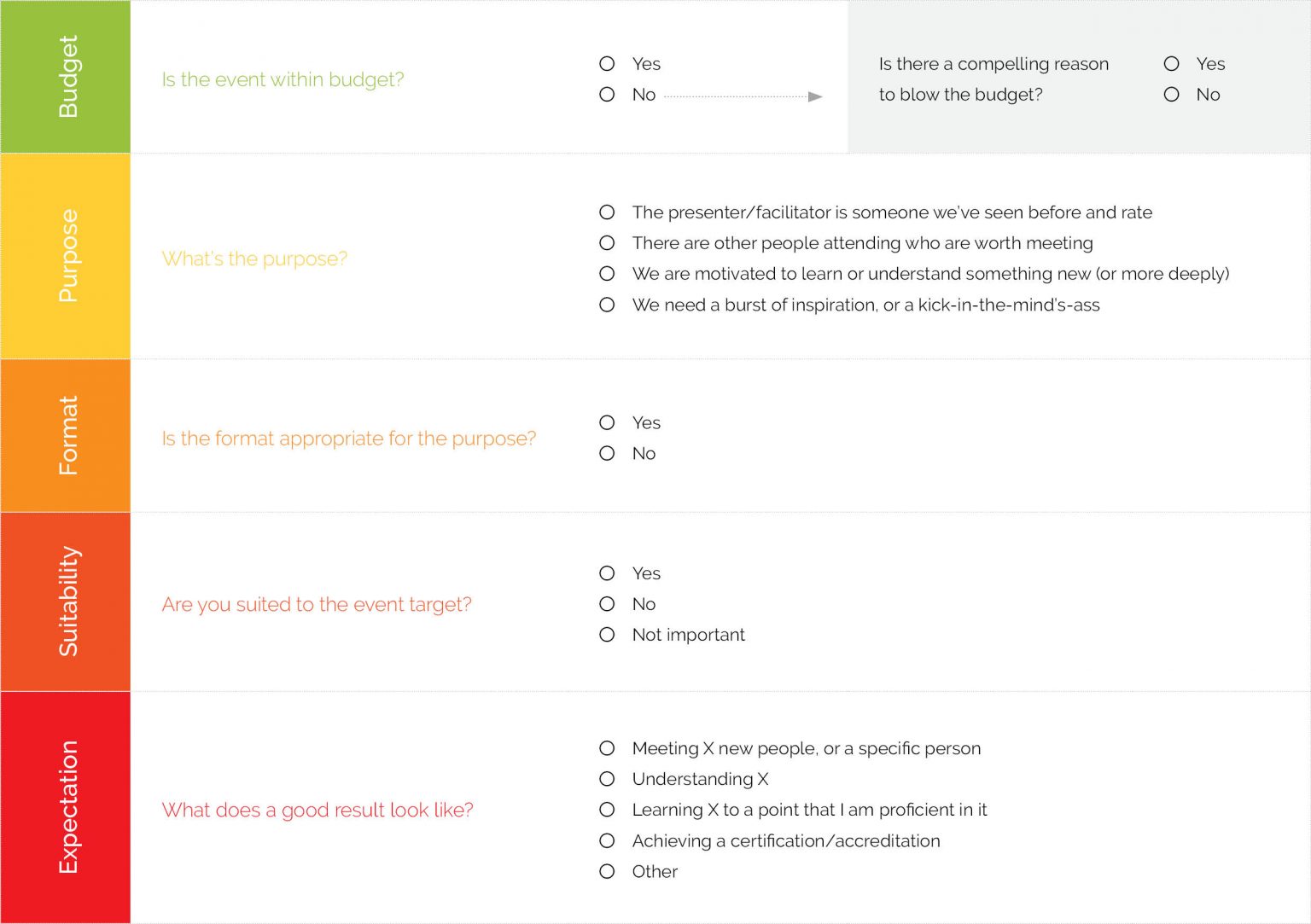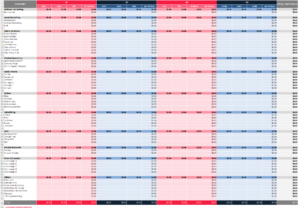The Sensible Workshop And Seminar Suitability Assessment The Sensible Workshop And Seminar Suitability Assessment

(Or SWASSA for short.)
Whilst recently reading through the leaked Paradise Papers and determining which upcoming ICO I was going to invest in (none of that is true), I received an email to attend a business workshop hosted by the State Government. Having had quick scan of the event details, I accepted said invitation and forwarded to a colleague to see if he too may be interested.
“Nah, think I’ll give it a miss”.
It may have been completely feasible that my friend was high and committed to a bag of gummy bears, but I chose to overthink his apathy and started pondering the prospect of seminar fatigue – the concept that there is just so much sh*t going on that we become a little numb to “invites” after a while, particularly in cases where we didn’t get anything of value from a previous experience.
If you search for “marketing events Brisbane”, more than 13 million results are found. This is great because it provides a lot of choice, but equally awful because with a lot of choice comes the increased likelihood of cognitive dissonance. And with repeated “regret”, we have the tendency to tune out completely (there was a time when Nicolas Cage was box office…)
Most of us are awful shoppers. Marketing and advertising works. If you don’t think it affects you, it has worked perfectly. So when it comes to choosing an event to attend or education program to follow, having a process for making the decision will give you a greater chance of getting value, and lessen the likelihood of you ending up p*ssed off and trawling LinkedIn looking for a fight.
Here’s how our team goes about assessing what events may work for us, and which ones should be avoided.
Set a budget (money and time)
Everything needs a budget. Education and events is no different (which we refer to as Ev & Ed, which in part is why our bookkeeper drinks so heavily). For us, when we are assigning a budget to something new, we start with a token figure of 10% of profits. We then reassess each year to see if this budget needs adjusting or not (based on value gained and our application of the value, for the outlay).
In this budget, we also include a cost for time. So in other words, if my going rate was $500 per hour (which it isn’t, but if you can afford that, let’s talk) and I was at a four hour workshop, the “cost” to us would be $2000 + the ticket price. Even if the event is “free”, we still associate a cost to it based on our time.
Understand the purpose
The first thing we ask when an event or training opportunity arises is, “Why do you want to go?” The answer usually needs to fit into one of (or combo of) four things:
- The presenter/facilitator is someone we’ve seen before and rate (and is offering something new).
- There are other people attending who will be worth meeting and potentially building a relationship with.
- We are motivated to learn or understand something new (or more deeply).
- We need a burst of inspiration, or need a kick-in-the-mind’s-ass.
Consider adding the event and the facilitator or host to your CRM and rate it, or make notes so next time you can estimate your expected level of value from another one of their events.
Understand the value in each format
Keep in mind there is a difference between learning and finding out. Learning is retaining information that you may need to apply at some point, finding out is being informed.
Let’s say the main motivator for attending training or an event was to learn a new skill. Unless it is something reasonably linear, a one-off shindig is probably not going to get the job done. So, a short-course, or ongoing program may be more appropriate.
You can’t go from zero to expert in a four-hour workshop. Malcolm Gladwell suggests about 10,000 hours, so sending your receptionist off to the Gold Coast on Thursday morning to become a social media marketing weapon by the afternoon has a very limited likelihood of success.
If the motivation is to meet people to grow your business relationships with, attending an industry specific event may be risky if you will be meeting other specialists like you (I have been a marketing person in a room full of other marketing people. I won’t go back).
Our rule of thumb is this:
- Anything two-days or less is for the purpose of finding out something new, refining an already largely understood skill, for gaining a new perspective, or for meeting new people.
- Anything long-term (like an annual membership or subscription training) needs to relate to the core purpose or future of the business.
- Anything web-based (particularly webinars) is usually treated with more scrutiny than the points above because too often, webinars just suck. Video education is less scrutinised.
- As a soft point, we also consider who is hosting and attending. This gives us a rough idea as to the quality of the event and ultimately the likelihood of us getting a result.
Understand you and your best method
Personally, I do well at large events, or in smaller groups. Mid-size (20 – 40 attendees) confuses me (should I contribute or do I just shut-up and learn?!) I keep this in mind when choosing an event. It’s not essential criteria, but may sway me depending on other factors (budget, competing events etc).
It also helps to understand the types of people you work well with. If you are someone who gets wound up by Gen Y, probably stay away from start-up and disruptive workshops. If you can’t tolerate political avoidance and deflective tactics, don’t get tickets to Q & A.
Determine how you measure the outcome in advance
The easiest way to determine if an event was worthwhile or not is by setting yourself an expectation i.e. I aim to understand/learn/achieve/meet X. If this doesn’t occur, there still may be value in it, but by setting a target, measurement becomes much easier.
To close the gap on the expectation vs the outcome, find out from the organiser what you can expect to gain from the experience. This may be documented in the event brief, but if not, find out for yourself before you make the commitment.
The sensible workshop and seminar shopping list cheat sheet summary in a brief nutshell
Your own strategies will be refined over time and will likely become less formalised than this process suggests, but for us, it takes the guess work out of which events are most suitable, and most importantly, keeps us excited about attending future events.










